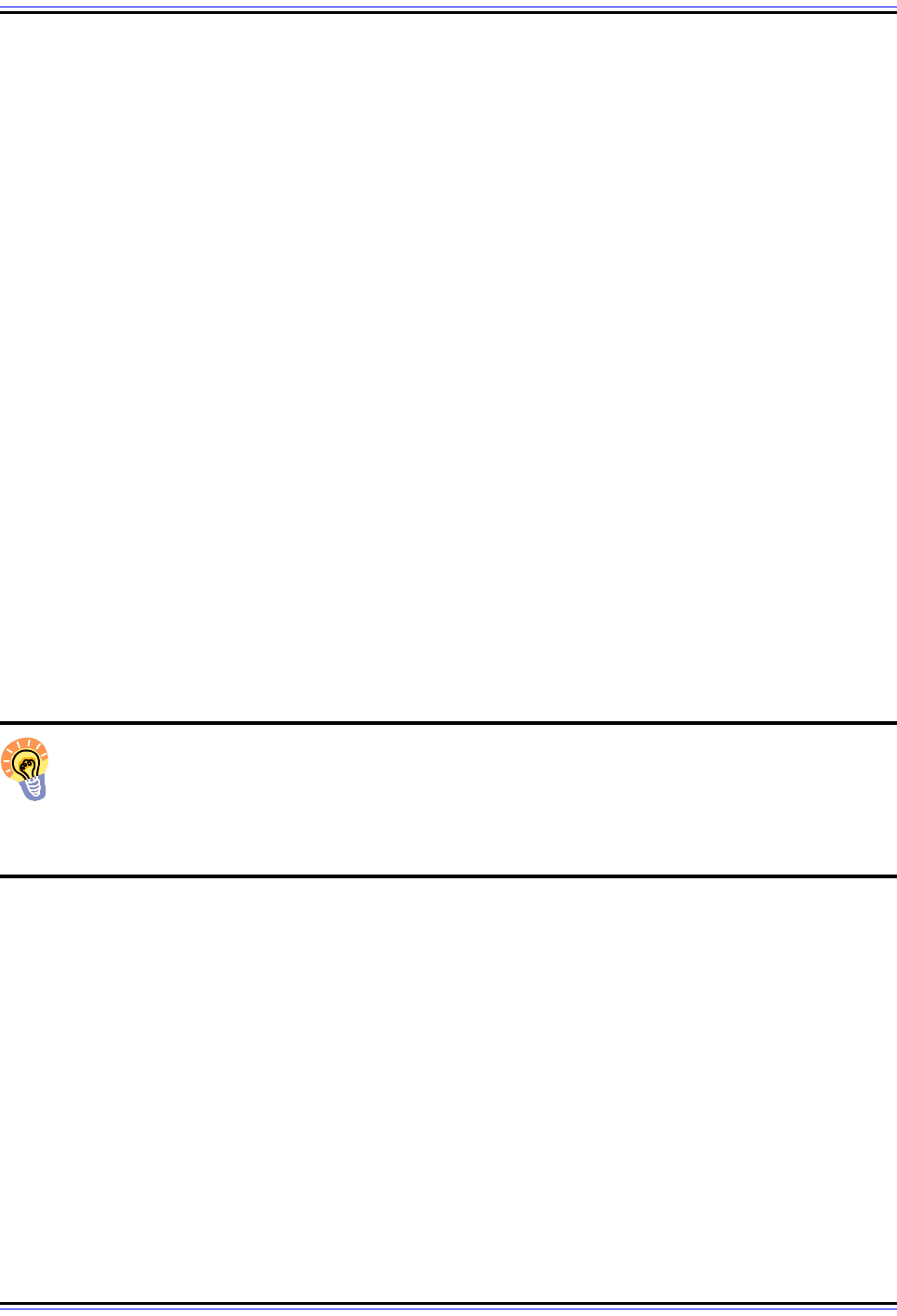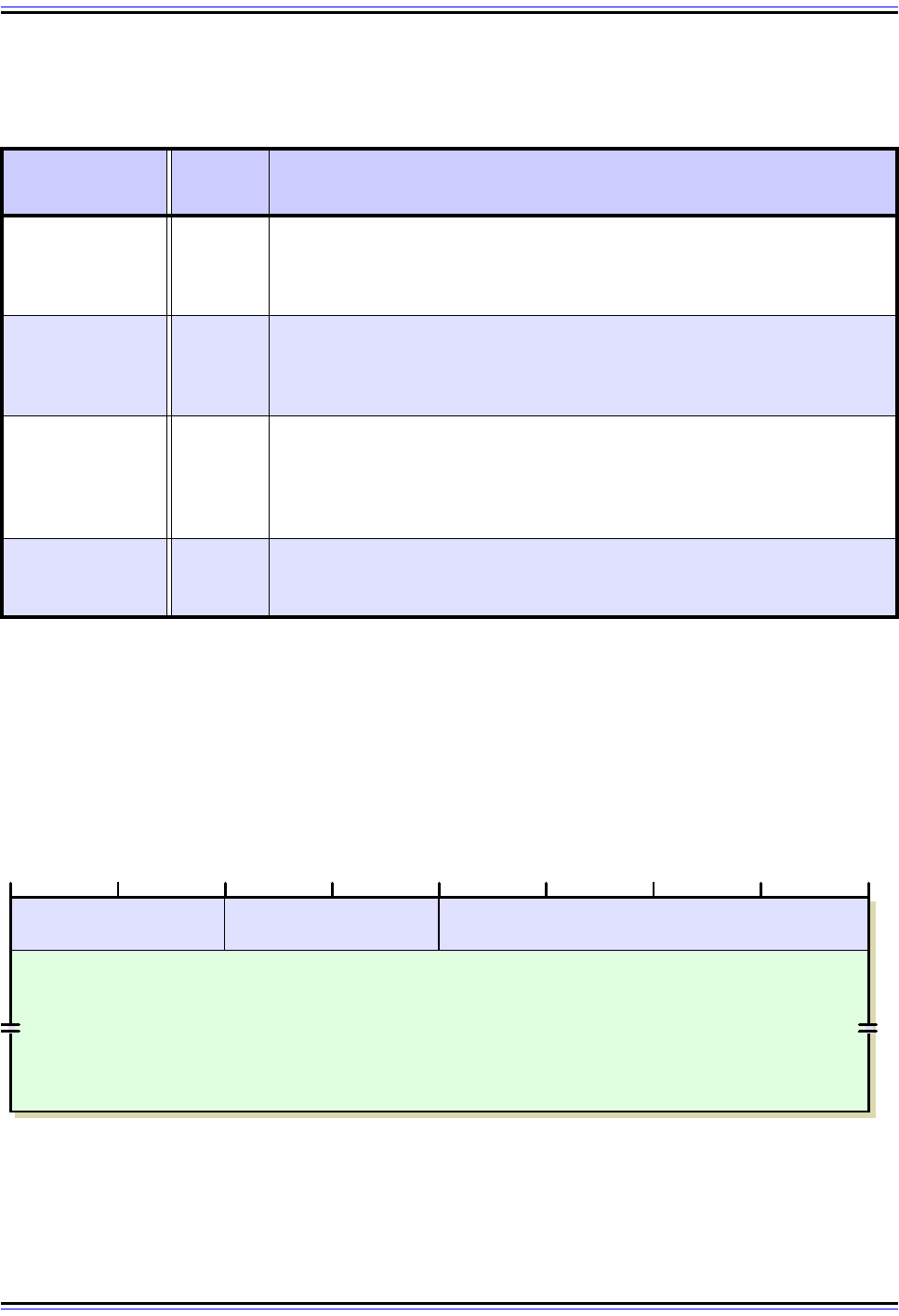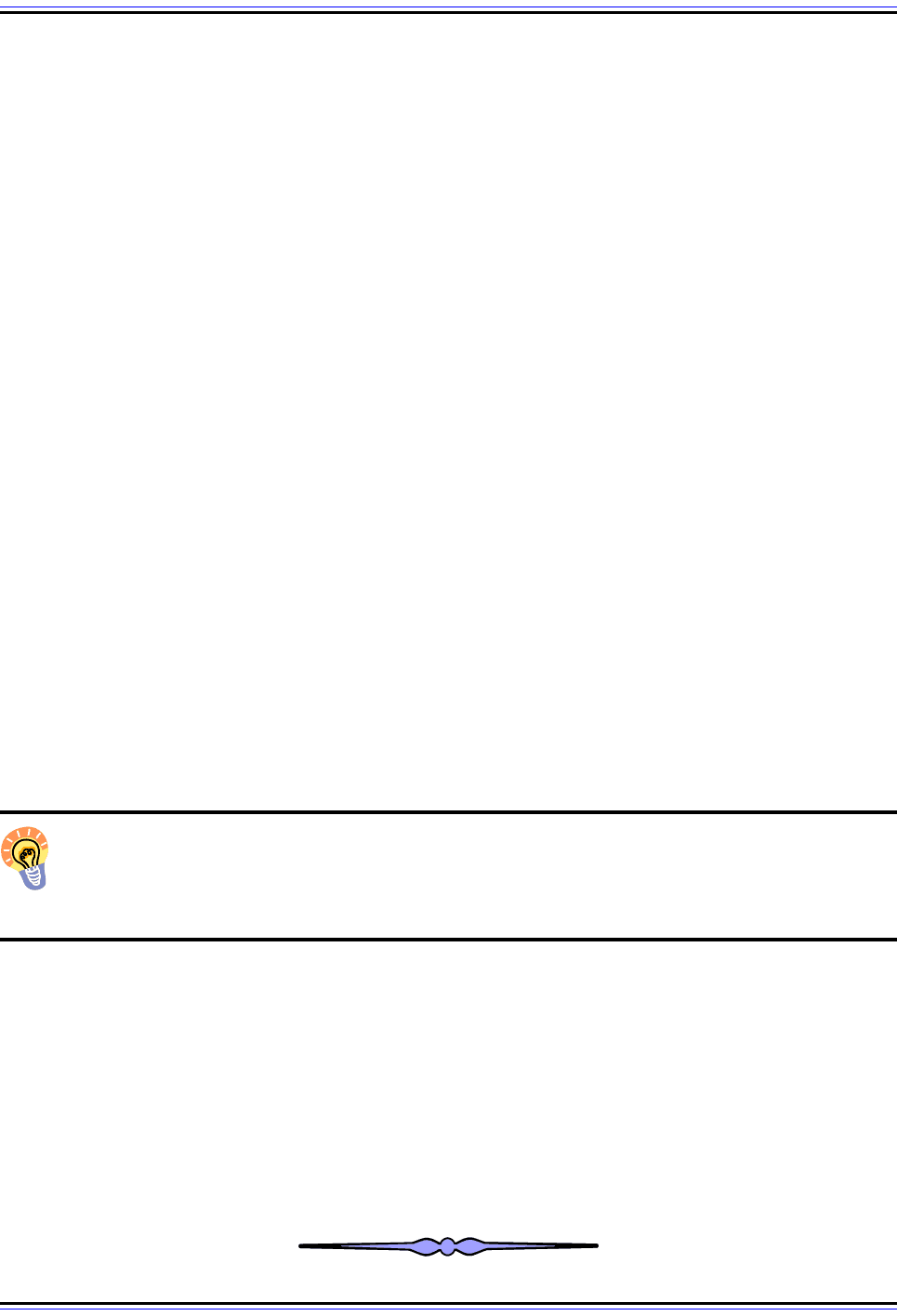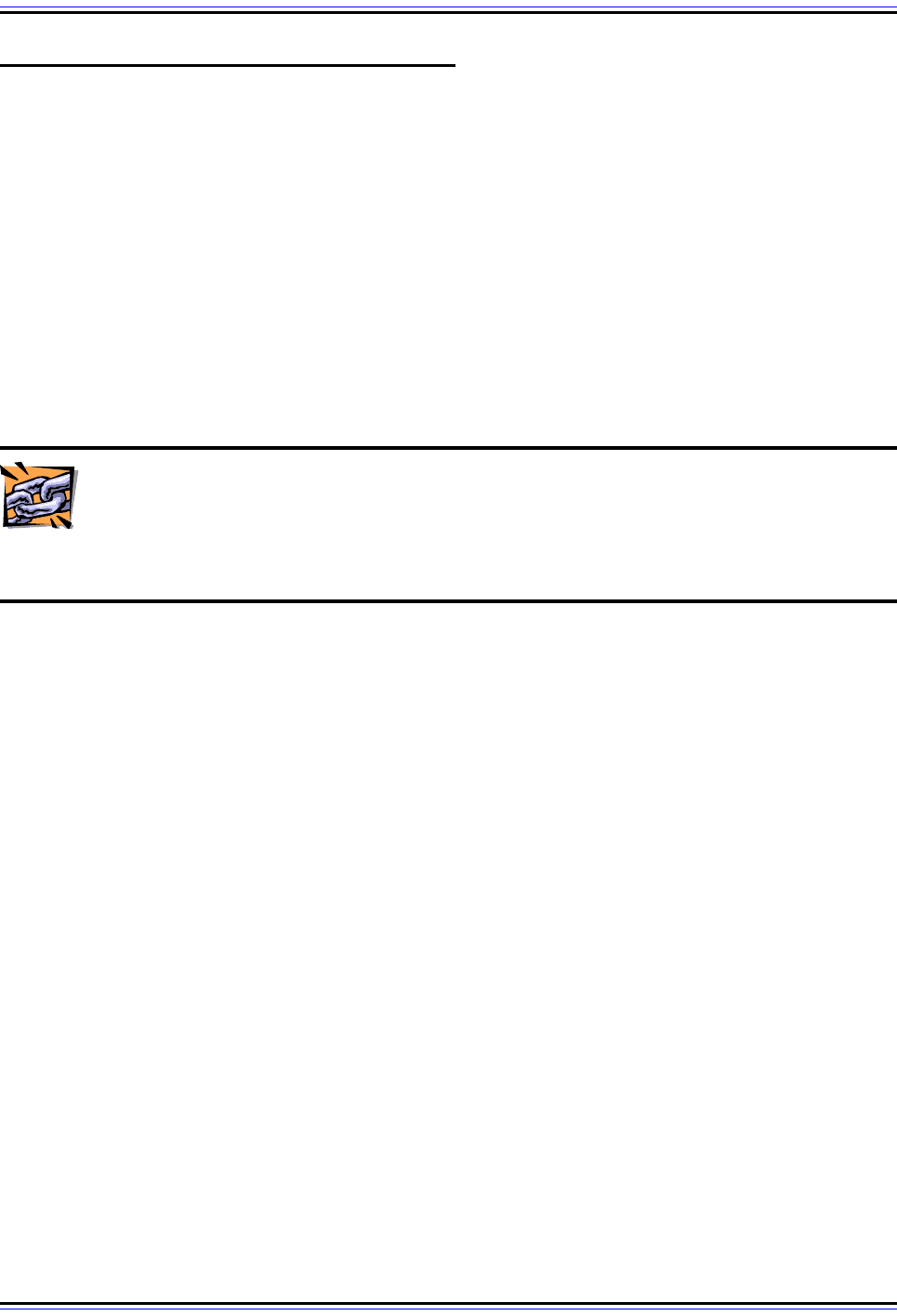Charles M. Kozierok The TCP-IP Guide
Подождите немного. Документ загружается.


The TCP/IP Guide - Version 3.0 (Contents) ` 611 _ © 2001-2005 Charles M. Kozierok. All Rights Reserved.
message types were separated. In IPv6, error messages have Type values from 0 to 127,
and informational messages have values from 128 to 255. Of course, only some of the Type
values are currently defined.
Key Concept: A total of 256 different possible message types can be defined for
each of ICMPv4 and ICMPv6. The Type field that appears in the header of each
message specifies the kind of ICMP message. In ICMPv4 there is no relationship
between Type value and message type; in ICMPv6 error messages have a Type value of 0
to 127, informational messages 128 to 255.
ICMP Message Codes
The message type indicates the general purpose of each kind of ICMP message. ICMP
also provides an additional level of detail within each message type in the form of a Code
field, which is also 8 bits. You can consider this field as a message “subtype”. Thus, each
message type can have up to 256 subtypes that are more detailed subdivisions of the
message's overall functionality. A good example is the Destination Unreachable message,
which is generated when a datagram cannot be delivered. In this message type, the Code
value provides more information on exactly why the delivery was not possible.
ICMP Message Class and Type Summary
A complete section describing all of the major ICMP message types for both ICMPv4 and
ICMPv6 has been included in this Guide. For convenience, I have summarized all these
message types in Table 87, which shows each of the Type values for the messages
covered in this Guide, the name of each message, a very brief summary of its purpose, and
the RFC that defines it. (To keep the table from being egregiously large I have not shown
each of the Code values for each Type value; these can be found in the individual message

The TCP/IP Guide - Version 3.0 (Contents) ` 612 _ © 2001-2005 Charles M. Kozierok. All Rights Reserved.
type descriptions.) The table is organized into sections in the same way as the ICMP
Message Types and Formats section, except this table is sorted by ascending Type value
within each category, for easier reference.
Table 87: ICMP Message Classes, Types and Codes (Page 1 of 2)
Message
Class
Type
Value
Message
Name
Summary Description of Message Type
Defining
RFC
Number
ICMPv4
Error
Messages
3
Destination
Unreachable
Indicates that a datagram could not be delivered to
its destination. The Code value provides more infor-
mation on the nature of the error.
792
4 Source Quench
Lets a congested IP device tell a device that is
sending it datagrams to slow down the rate at which
it is sending them.
792
5 Redirect
Allows a router to inform a host of a better route to
use for sending datagrams.
792
11 Time Exceeded
Sent when a datagram has been discarded prior to
delivery due to expiration of its Time To Live field.
792
12
Parameter
Problem
Indicates a miscellaneous problem (specified by the
Code value) in delivering a datagram.
792
ICMPv4
Informa-
tional
Messages
(part 1 of 2)
0 Echo Reply
Sent in reply to an Echo (Request) message; used
for testing connectivity.
792
8 Echo (Request)
Sent by a device to test connectivity to another
device on the internetwork. The word “Request”
sometimes appears in the message name.
792
9
Router
Advertisement
Used by routers to tell hosts of their existence and
capabilities.
1256
10
Router
Solicitation
Used by hosts to prompt any listening routers to
send a Router Advertisement.
1256
13
Timestamp
(Request)
Sent by a device to request that another send it a
timestamp value for propagation time calculation and
clock synchronization. The word “Request”
sometimes appear in the message name.
792
14
Timestamp
Reply
Sent in response to a Timestamp (Request) to
provide time calculation and clock synchronization
information.
792
15
Information
Request
Originally used to request configuration information
from another device. Now obsolete.
792

The TCP/IP Guide - Version 3.0 (Contents) ` 613 _ © 2001-2005 Charles M. Kozierok. All Rights Reserved.
ICMPv4
Informa-
tional
Messages
(part 2 of 2)
16
Information
Reply
Originally used to provide configuration information
in response to an Information Request message.
Now obsolete.
792
17
Address Mask
Request
Used to request that a device send a subnet mask. 950
18
Address Mask
Reply
Contains a subnet mask sent in reply to an Address
Mask Request.
950
30 Traceroute
Used to implement the experimental “enhanced”
traceroute utility.
1393
ICMPv6
Error
Messages
1
Destination
Unreachable
Indicates that a datagram could not be delivered to
its destination. Code value provides more infor-
mation on the nature of the error.
2463
2 Packet Too Big
Sent when a datagram cannot be forwarded
because it is too big for the maximum transmission
unit (MTU) of the next hop in the route. This
message is needed in IPv6 and not IPv4 because in
IPv4, routers can fragment oversized messages,
while in IPv6 they cannot.
2463
3 Time Exceeded
Sent when a datagram has been discarded prior to
delivery due to the Hop Limit field being reduced to
zero.
2463
4
Parameter
Problem
Indicates a miscellaneous problem (specified by the
Code value) in delivering a datagram.
2463
ICMPv6
Informa-
tional
Messages
128 Echo Request
Sent by a device to test connectivity to another
device on the internetwork.
2463
129 Echo Reply
Sent in reply to an Echo (Request) message; used
for testing connectivity.
2463
133
Router
Solicitation
Prompts a router to send a Router Advertisement. 2461
134
Router
Advertisement
Sent by routers to tell hosts on the local network the
router exists and describe its capabilities.
2461
135
Neighbor
Solicitation
Sent by a device to request the layer two address of
another device while providing its own as well.
2461
136
Neighbor
Advertisement
Provides information about a host to other devices
on the network.
2461
137 Redirect
Redirects transmissions from a host to either an
immediate neighbor on the network or a router.
2461
138
Router
Renumbering
Conveys renumbering information for router
renumbering.
2894
Table 87: ICMP Message Classes, Types and Codes (Page 2 of 2)
Message
Class
Type
Value
Message
Name
Summary Description of Message Type
Defining
RFC
Number

The TCP/IP Guide - Version 3.0 (Contents) ` 614 _ © 2001-2005 Charles M. Kozierok. All Rights Reserved.
You can see that several of the message types are quite similar in ICMPv4 and ICMPv6, but
there are some slight differences. An obvious one is that Redirect is considered an error
message in ICMPv4, but an informational message in ICMPv6. The way that the messages
is used also often different. In IPv6, the use of many of the ICMP informational messages is
described in the Neighbor Discovery (ND) protocol, which is new to IPv6.
Note that the Information Request and Information Reply messages were originally created
to allow devices to determine an IP address and possibly other configuration information.
This function was later implemented using protocols such as RARP, BOOTP and DHCP,
and these message types obsoleted.
ICMP Message Creation and Processing Conventions and Rules
In the overview of ICMP I compared the relationship between IP and ICMP to that between
an executive and an administrative assistant. One of the characteristics that many execu-
tives value in a good assistant is that the assistant does his or her work independently, and
without causing unnecessary disruption. A good assistant should save the executive time,
not cost him or her time.
As the “assistant” to IP, ICMP must similarly help IP function without taking up too much of
its “time”. Here, the resource being conserved is not so much “time” as bandwidth. ICMP
messages are important, but must be considered part of the “overhead” of running a
network. They carry no user data, so each one represents a small loss of overall end-user
bandwidth on the network. For this reason, we want to send them only when necessary,
and to carefully control the circumstances under which they are generated.
Now, administrative assistants have some serious advantages over networking protocols:
common sense and experience. They usually know where the line is drawn between help
and hindrance; computers don't. To partially compensate, ICMP's operation is guided by a
set of conventions or rules for how messages are created and processed. For ICMPv4,
these conventions are described in part in the defining RFC 792, but much more in RFC
1122 (Requirements for Internet Hosts — Communication Layers
), which provides specific
information on implementing TCP/IP in host devices. In ICMPv6, the information related to
ICMP implementation that appears in RFC 1122 has been largely incorporated into the
main document that defines ICMPv6, RFC 2463.
Limitations on ICMP Message Responses
Most of the issues related to message generation have to do with error messages, not infor-
mational messages. The latter class of messages usually don't cause problems because
they are generated based on specific rules already established in the protocols that use
them. For example, Router Advertisement messages are sent by routers on a regular basis,
and the routers make sure this is infrequent. They are also sent in response to Router Solic-
itation messages sent on occasion by hosts, and as long as a host doesn't go haywire and
start sending tons of Solicitations, there won't be a problem. Even then, a router can be
given enough smarts not to send Router Advertisements too often.

The TCP/IP Guide - Version 3.0 (Contents) ` 615 _ © 2001-2005 Charles M. Kozierok. All Rights Reserved.
The problem comes up with error messages specifically because they are sent in
response to so many situations. Potentially, they may even be sent in response to each
other. Without special care, loops or cascading message generation might occur. For
example, consider a situation where device A encounters an error and sends an error
report to device B. Device B finds an error in device A's message and sends an error report
back to device A. This could result in billions of messages being sent back and forth
clogging the network, until a human figures out what is wrong and fixes it.
To prevent such problems, an ICMP error message must not be generated in response to
any of the following:
☯ An ICMP Error Message: This prevents loops of the type just mentioned. Note,
however, that an ICMP error message can be generated in response to an ICMP infor-
mational message.
☯ A Broadcast or Multicast Datagram: What would happen if a datagram were
broadcast to 5,000 hosts and each of them found an error in it and tried to send a
report back to the source? Something unpleasant.
☯ IP Datagram Fragments Except The First: When a datagram is fragmented, errors
may only be sent in response to the first fragment. Often, errors that are generated
due to a problem with one fragment would also be generated by each successive one,
causing unnecessary ICMP traffic.
☯ Datagrams With Non-Unicast Source Address: If a datagram's source address
doesn't define a unique, unicast device address, an error message cannot be sent
back to that source. This prevents ICMP messages from being broadcast, unicast, or
sent to non-routable special addresses such as the loopback address.
Key Concept: In order to prevent excessive numbers of ICMP messages from being
sent on a network, a special set of rules is put into place to govern when and how
they may be created. Most of these are designed to eliminate situations where very
large numbers of ICMP error messages would be generated in response to certain
occurrences.
These rules apply to both ICMPv4 and ICMPv6, but in ICMPv6 there are a couple of special
cases. In certain circumstances an ICMPv6 Packet Too Big message may be sent to a
multicast address, as this is required for Path MTU Discovery to work. Certain Parameter
Problem messages may also be sent to multicast or broadcast addresses. Finally, in
addition to the rules above, IPv6 implementations are specifically directed to limit the rate at
which they send ICMPv6 messages overall.
ICMP Message Processing Conventions
Message processing generally takes place as described in the topic on general operation,
with the ICMP message delivered either to the IP software or other protocol software imple-
mentation as required. What is done with the message usually depends on its type. Some
are destined only for the IP software itself, but many are intended for the higher-layer

The TCP/IP Guide - Version 3.0 (Contents) ` 616 _ © 2001-2005 Charles M. Kozierok. All Rights Reserved.
protocol that generated the datagram that led to the error. In the next topic we will see that
ICMP error messages include information that allows the upper-layer protocol to be
extracted for the purpose of passing the message to the appropriate software layer.
In IPv6, the class of message (error or informational) can be determined from the Type
value. This knowledge can then be used to guide processing of ICMP messages with
unknown Type values. The rule is that ICMP error messages with unknown Type values
must be passed to the appropriate upper layer protocol. Informational messages with
unknown Type values are discarded without taking action.
In addition to these general rules, there are specific rules put into place to guide the
processing of some of the message types. I describe some of these conventions in the
topics that discuss individual ICMP messages.
An important final point is that ICMP messages, especially error messages, are not
considered "binding" on the device that processes them. To stick with the office analogy,
they have the equivalent status in an office of only of an "FYI memo", not an "assignment".
It is often the case that a device should take action upon processing an ICMP message,
but the device is not required to. The exception, again, is when informational messages are
used for specific purposes. For example, most of the messages that come in pairs are
designed so that a Request results in the matching Reply and a Solicitation yields an
Advertisement.
Key Concept: A device receiving an ICMP message is not required to take action
unless a protocol using a message type dictates a specific response to a particular
message type. In particular, devices are not mandated to perform any specific task
when receiving an ICMP error message.
ICMP Common Message Format and Data Encapsulation
As we have seen in the preceding topics, ICMP is not so much a protocol that performs a
specific function as a framework for the exchange of error reports and information. Since
each of the message types is used for a different purpose, they differ in the types of infor-
mation each contains. This means each ICMP message has a slightly different format. At
the same time, however, ICMP message types also have a degree of commonality—a
portion of each message is common between message types.
ICMP Common Message Format
The structure of an ICMP message can be generally thought of as having a common part
and a unique part. The common part consists of three fields that have the same size and
same meaning in all ICMP messages (though the values in the fields aren't the same for
each ICMP message type, of course). The unique part contains fields that are specific to
each type of message.

The TCP/IP Guide - Version 3.0 (Contents) ` 617 _ © 2001-2005 Charles M. Kozierok. All Rights Reserved.
Interestingly, the common message format is basically the same for ICMPv4 and ICMPv6. It
is described in Table 88 and Figure 138.
The message body typically contains one or several fields that carry information of
relevance to each specific type of ICMP message. For error messages, we see here one
more area of commonality in ICMP messages: all ICMP error messages include a portion of
the original IP datagram that led to the ICMP error message. This aids in diagnosing the
problem that caused the ICMP message to be generated, by allowing the error to be
communicated to higher layers.
Table 88: ICMP Common Message Format
Field Name
Size
(bytes)
Description
Type 1
Type: Identifies the ICMP message type. For ICMPv6, values from 0 to
127 are error messages and values 128 to 255 are informational
messages. Common values for this field are given in the table in the topic
on ICMP message classes and types.
Code 1
Code: Identifies the “subtype” of message within each ICMP message
Type value. Thus, up to 256 “subtypes” can be defined for each message
type. Values for this field are shown in the individual ICMP message type
topics.
Checksum 2
Checksum: 16-bit checksum field that is calculated in a manner similar to
the IP header checksum in IPv4. It provides error detection coverage for
the entire ICMP message. Note that in ICMPv6, a pseudo-header of IPv6
header fields is prepended for checksum calculation; this is similar to the
way this is done in TCP.
Message
Body / Data
Variable
Message Body: Contains the specific fields used to implement each
message type. This is the unique part of the message as I mentioned
above.
Figure 138: ICMP Common Message Format
This overall, generic message format is used for both ICMPv4 and ICMPv6 message types.
Type Code Checksum
Message Body
(For Error Messages, Encapsulated Portion of Original IP Datagram)
4 8 12 16 20 24 28 320

The TCP/IP Guide - Version 3.0 (Contents) ` 618 _ © 2001-2005 Charles M. Kozierok. All Rights Reserved.
Original Datagram Inclusion In ICMP Error Messages
The inclusion of original IP datagram information is done differently for the two ICMP
versions.
ICMPv4 Error Messages
Each error message includes the full IP header and the first 8 bytes of the payload. Since
the beginning of the payload will contain the encapsulated higher-layer header, this means
the ICMP message also carries either the full UDP header, or the first 8 bytes of the TCP
header. In both cases, the source and destination port numbers are part of what is included.
If the original header was a standard IP header with no options, the Message Body will
therefore have a length of 28 bytes; if options are present, it will be larger.
ICMPv6 Error Messages
Each error message includes as much of the IPv6 datagram as will fit without causing the
size of the ICMPv6 error message (including its IP header encapsulation) to exceed the
minimum IPv6 maximum transmission unit size, which is 1280 bytes. This provides
additional information for diagnostic purposes compared to ICMPv4, while ensuring that no
ICMPv6 error messages will be too large for any physical network segment. The larger size
of the included data allows the IPv6 extension headers to be included in the error message,
since the error could be in one of those extension headers.
Remember that in IPv6, routers cannot fragment IP datagrams; any datagram that is
“oversized” for an underlying physical network is dropped. ICMPv6 is thus designed to
ensure that this does not happen by not creating ICMPv6 datagrams over the universal
IPv6 MTU size of 1280.
Key Concept: Each kind of ICMP message contains data unique to that message
type, but all messages are structured according to a common ICMP message format.
ICMP error messages always include in their message body field some portion of the
original IP datagram that resulted in the error being generated.
ICMP Data Encapsulation
After an ICMP message is formatted, it is encapsulated in an IP datagram like any other IP
message. This is why some people believe ICMP is architecturally a higher layer than IP,
though as we discussed earlier it is really more of a special case. You can also see then,
that when an ICMP error message is generated, we end up with the original IP header and
part or all of the payload, encapsulated in the ICMP message, in turn encapsulated within a
new IP header to be sent back as an error report usually to the device that sent the original
IP message.

The TCP/IP Guide - Version 3.0 (Contents) ` 619 _ © 2001-2005 Charles M. Kozierok. All Rights Reserved.
ICMP Message Types and Formats
The Internet Control Message Protocol (ICMP) provides a mechanism for error reporting
and the exchange of important information between IP devices. Many different message
types exist within ICMP, which have certain common attributes that we saw in the section
discussing ICMP generalities. Beyond these commonalities, the details of how ICMP
messages are created and used diverge based on the specific message type, so it's time to
look at these and see how they work.
In this section I provide specific details on the most commonly-seen ICMP message types,
including a description of both their use and their specific message formats. There are 20
different message types currently covered, so they have been divided into four subsections
for better organization. These correspond to the four combinations of ICMP version
(ICMPv4 and ICMPv6) and message class (error and informational).
Related Information: For a cross-reference of message types and corresponding
ICMP Type field values, see the general topic on ICMP message classes and
types. For more information on the “common” ICMP message format fields (Type,
Code and Checksum) and incorporation of original IP datagram information in error
messages, see the topic on ICMP Common Message Format and Data Encapsulation.

The TCP/IP Guide - Version 3.0 (Contents) ` 620 _ © 2001-2005 Charles M. Kozierok. All Rights Reserved.
ICMP Version 4 (ICMPv4) Error Message Types and Formats
ICMP error messages are used by routers and hosts to tell a device that sent a datagram
about problems encountered in delivering it. In the original ICMP version 4, five different
error messages are defined, which are all described in the original ICMP standard, RFC
792. These are some of the most important ICMP messages, since they provide critical
feedback about error conditions and may help a transmitting device take corrective action to
ensure reliable and efficient datagram delivery.
In this first of four sections on specific ICMP types, I look at the ICMPv4 error messages. I
begin with Destination Unreachable messages, which are sent due to datagram delivery
failures, and Source Quench messages, used to tell a device to slow down the rate at which
it sends datagrams. Next I describe Time Exceeded messages, sent when a datagram has
been traveling the network too long or takes too long to be reassembled from fragments,
and Redirect messages, which let a router provide feedback about better routes to a host.
Finally, I discuss Parameter Problem messages, a generic “catch all” type used for
problems not covered by other ICMP error messages.
ICMPv4 Destination Unreachable Messages
Since the Internet Protocol is an unreliable protocol, there are no guarantees that a
datagram sent by one device to another will ever actually get there. The internetwork of
hosts and routers will make a “best effort” to deliver the datagram but it may not get where it
needs to for any number of reasons. Of course, devices on an IP network understand that
and are designed accordingly. IP software never assumes its datagrams will always be
received, and higher layer protocols like TCP take care of providing reliability and acknowl-
edgements of received data for applications that need these features.
This setup, with higher layers handling failed deliveries, is sufficient in some cases. For
example, suppose device A tries to send to device B, but a router near B is overloaded, so
it drops the datagram. In this case the problem is likely intermittent, so A can retransmit and
eventually reach B. But what about a situation where a device is trying to send to an IP
address that doesn't exist, or a problem with routing that isn't easily corrected? Having the
source just continually retry while it remains “in the dark” about the problem would be ineffi-
cient, to say the least.
So in general, while IP is designed to allow IP datagram deliveries to fail, we should take
any such failures seriously. What we really need is a feedback mechanism that can tell a
source device that something improper is happening, and why. In IPv4, this service is
provided through the transmission of Destination Unreachable ICMP messages. When a
source node receives one of these messages it knows there was a problem sending a
datagram, and can then decide what action, if any, it wants to take. Like all ICMP error
messages, Destination Unreachable messages include a portion of the datagram that could
not be delivered, which helps the recipient of the error figure out what the problem is.
